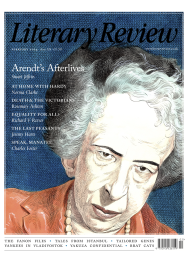Minoo Dinshaw
Syracuse by Shannon
Glorious Exploits
By Ferdia Lennon
Fig Tree 288pp £16.99
The Mask of Apollo (1966), one of Mary Renault’s less memorable historical novels, is set in ancient Athens and Syracuse and has at its centre the performance of Greek tragedy. Glorious Exploits, Ferdia Lennon’s engrossing, surprising debut, is superficially similar in period, setting and preoccupations. But where Renault (for once) fell short, Lennon has produced something truly rich and strange. Renault’s Sicily, a provincial, rather colourless backdrop, was culturally subordinate to Athens, where the main characters had been educated. Lennon’s Syracuse, freshly victorious over Athens, is somewhere else and of its own. All this Lennon achieves with boldness, playfulness and very few inhibitions by drawing on his own dual identity, half-Irish and half-Libyan. He writes with a wit and an enchantment that very seldom waver.
Sicily is Ireland. That much becomes obvious almost as soon as we meet our narrator, Lampo, a self-mocking, swaggering representative of an irreverent, broguish populace. By the same token, defeated, hubristic Athens is Britain (perhaps that strikes the right note in our current, chastened national mood). Late in the novel, an old Syracusan flautist writes off the Athenians as ‘a melancholy people’ and receives an impassioned response from an Athenian oligarch-turned-prisoner-turned-actor: ‘There’s more to Athens than tragedy … We laugh till we cry … We drink till we fall down, but we’re up first thing in the morning to scheme and love and build and do it all again. It’s a city of belief, not despair.’
Lennon is excellent on belief (this speaker’s longing hope is eventually fulfilled, sort of), on despair (liberally distributed) and on booze – alcohol Grecian and Italian (‘Catanian red’), as well as a more exotically fiery liquor, suffuse the novel. For if Sicily is Ireland, Ireland is also present in propria

Sign Up to our newsletter
Receive free articles, highlights from the archive, news, details of prizes, and much more.@Lit_Review
Follow Literary Review on Twitter
Twitter Feed
How to ruin a film - a short guide by @TWHodgkinson:
Thomas W Hodgkinson - There Was No Sorcerer
Thomas W Hodgkinson: There Was No Sorcerer - Box Office Poison: Hollywood’s Story in a Century of Flops by Tim Robey
literaryreview.co.uk
How to ruin a film - a short guide by @TWHodgkinson:
Thomas W Hodgkinson - There Was No Sorcerer
Thomas W Hodgkinson: There Was No Sorcerer - Box Office Poison: Hollywood’s Story in a Century of Flops by Tim Robey
literaryreview.co.uk
Give the gift that lasts all year with a subscription to Literary Review. Save up to 35% on the cover price when you visit us at https://literaryreview.co.uk/subscribe and enter the code 'XMAS24'